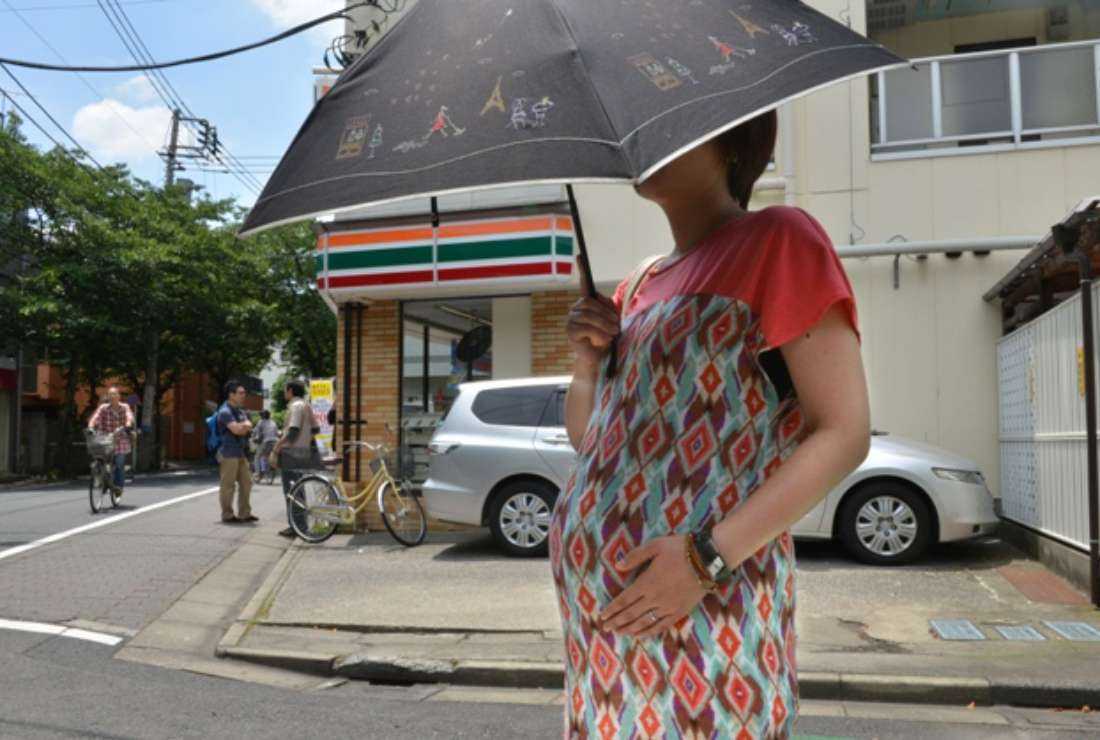
A pregnant woman walks to her office in Tokyo on July 2, 2013. A growing number of Japanese women are considering egg freezing as a solution to the challenges of balancing careers and family planning. (Photo: AFP)
The growing trend of egg freezing in Japan is raising critical questions about its efficacy as a solution to the challenges women face in balancing careers and family planning.
As a supposed antidote to the declining birth rate, the Tokyo Metropolitan Government's move to provide conditional subsidies for egg freezing seems well-intentioned.
However, upon closer inspection, it's worth considering whether this practice truly serves the long-term well-being of both women and their potential offspring.
Presently, egg freezing remains a self-financed endeavor due to the lack of insurance coverage. The Tokyo Metropolitan Government's proposal to extend subsidies is aimed at lightening the financial burden, though uncertainties remain regarding its initiation.
Various private companies also offer egg-freezing subsidies under their employee welfare programs, which is another way of asking women to delay any planning of childbirth.
Egg freezing is a multi-step process involving ovulatory agents, egg retrieval, and storage, which doesn’t come cheap. It is in fact substantially costly at each stage of the process.
While it appears to address the difficulties faced by women in early pregnancy and childbirth, it inadvertently raises concerns about the wisdom of postponing childbirth in favor of career advancement.
On a popular radio show on the national broadcaster NHK the director's insights from a seminar on egg freezing reveal the motivations behind this decision, particularly among women in their thirties.
These women’s aspiration, the female director says during the program, is to secure young and healthy eggs, in a move that would reduce the anxiety surrounding their declining fertility.
"The process of stimulating the ovaries and extracting eggs is not a very simple one"
Yet, this prompts a question: Is the pursuit of prolonged career growth outweighing the benefits of embracing motherhood at a biologically opportune time?
Participants' explanations for considering egg freezing shed light on the complex web of societal expectations and professional commitments in the Japanese landscape.
While career growth is crucial, it's worth considering whether the pursuit of a higher position or the constraints posed by a partner's work obligations warrant the potential risks associated with delayed childbirth.
The case of a 33-year-old woman undergoing egg collection for the first time highlights the dilemma faced by single professionals. Her decision was driven by a company-enforced overseas assignment, leading her to question the feasibility of marrying and starting a family while abroad.
The egg-freezing process itself, while offering a glimmer of hope of an actual pregnancy, presents certain limitations. The process of stimulating the ovaries and extracting eggs is not a very simple one. It involves anesthesia as it is an actual operation.
However, the probability of successfully implanting frozen eggs is disturbingly low, ranging from 17 percent to 41 percent. The path to successfully developing and birthing each egg is even more exceptional, with odds ranging from 4.5 percent to 12 percent.
Egg freezing's benefits, while noteworthy, warrant a certain amount of skepticism. While on the surface it aims to combat egg aging, prepare for future health concerns, and provide mental stability, the stark reality of low success rates remains.
Additionally, the long-term health implications for children born from older mothers are not something that can just be ignored, as gestational hypertension and diabetes risks surge with maternal age.
"While egg freezing can offer psychological benefits, it is not a panacea"
A major question emerges: Is it a sustainable solution for women to place their reproductive potential on hold while they pursue their careers?
In the traditional narrative, women often feel societal pressure to find a partner and start a family at a certain age. This pressure can lead to feelings of anxiety, stress, and even depression, as they grapple with the timing of family planning amidst other life priorities such as education, career, and personal growth.
Egg freezing seems to present an alternative path, allowing women to defer the decision of starting a family until they are more emotionally, financially, and personally ready.
One of the ways egg freezing can contribute to mental stability is by offering women the option to extend their fertility timeline. This seems to alleviate the sense of urgency that often accompanies the search for a partner solely for the purpose of starting a family before their biological clock ticks away.
However, while egg freezing can offer psychological benefits, it is not a panacea, as we see it is a costly operation with many risks involved. Egg freezing should be viewed as the last tool to provide flexibility in family planning, rather than a sole solution.
Perhaps the Japanese government instead of just handing out more subsidies in the lost battle against the population decline, would be better off offering a public discussion on re-evaluating the balance between work and family life, and whether bearing a child at a biologically optimal age doesn’t outweigh the trade-offs of relying on the uncertain success of frozen eggs.
*The views expressed in this article are those of the author and do not necessarily reflect the official editorial position of UCA News.


